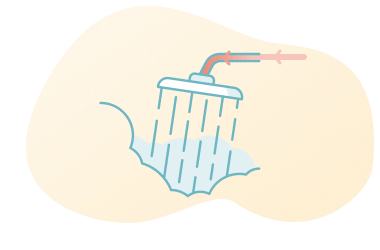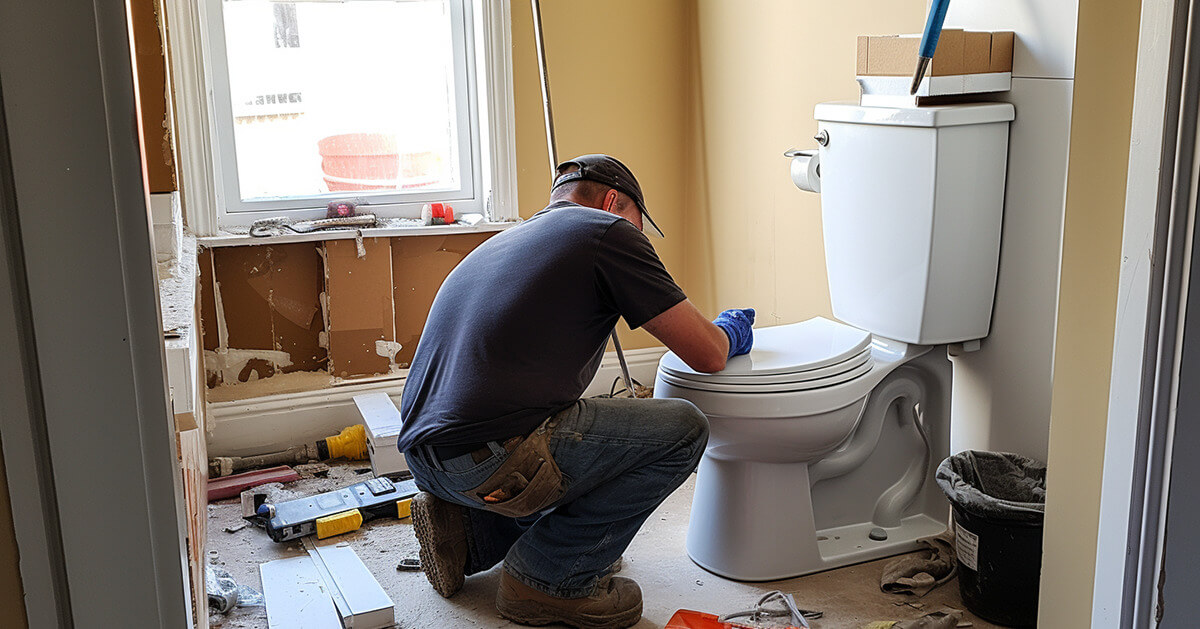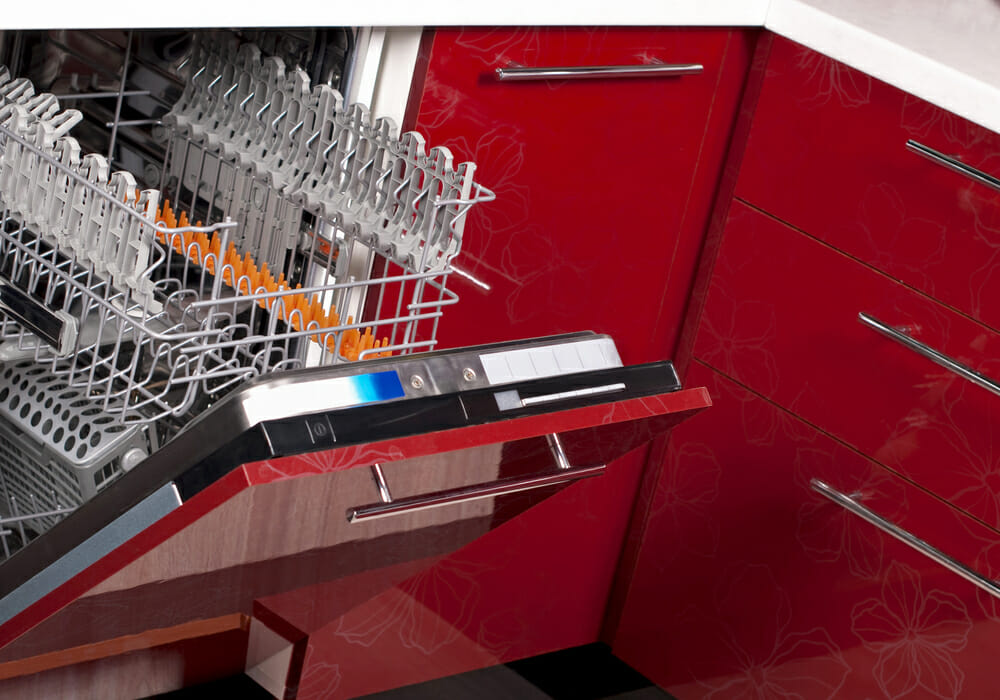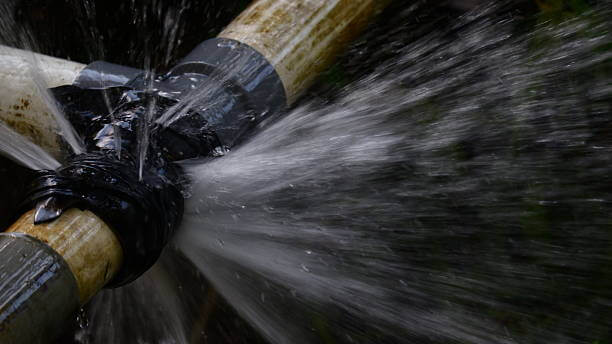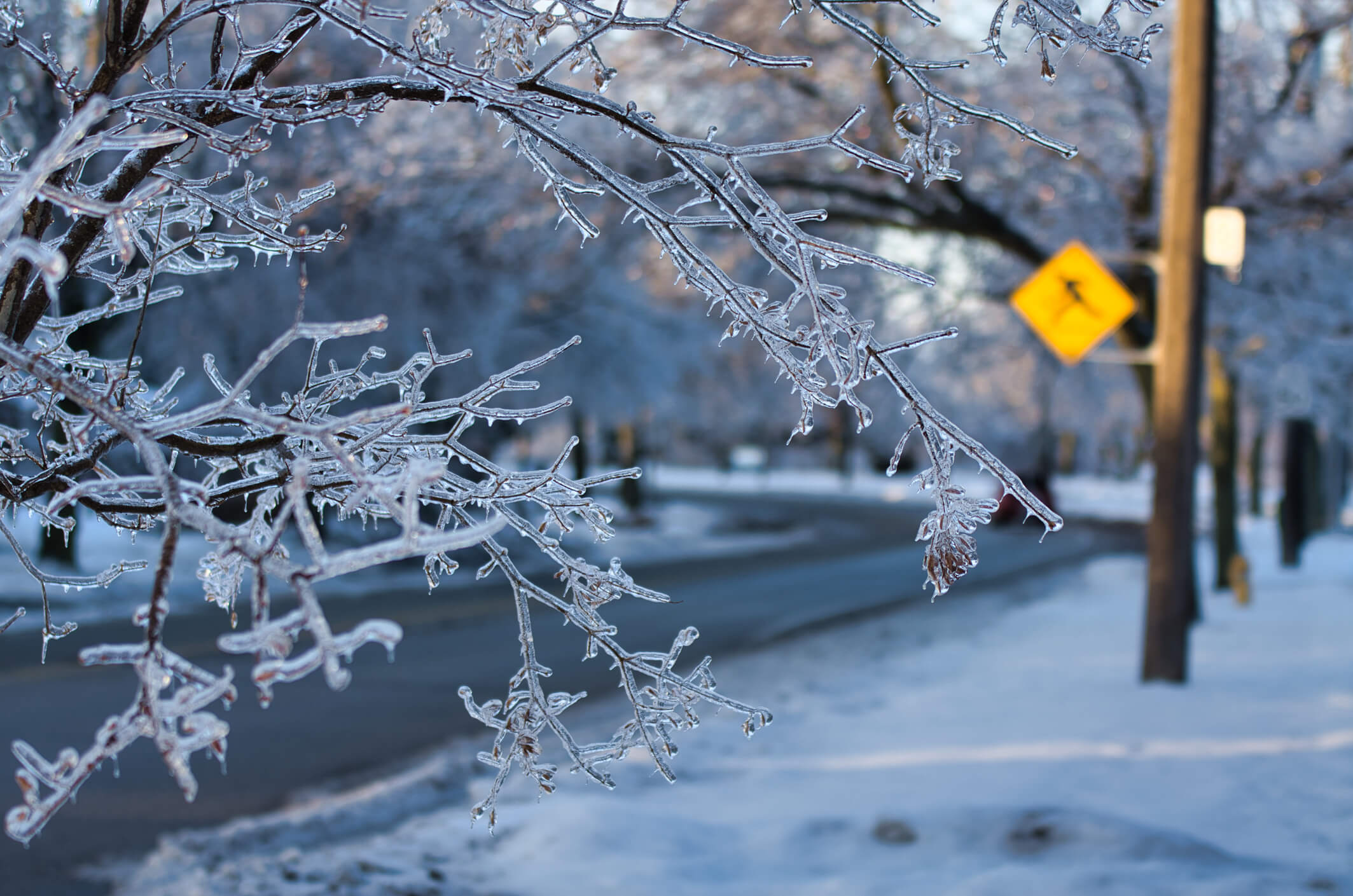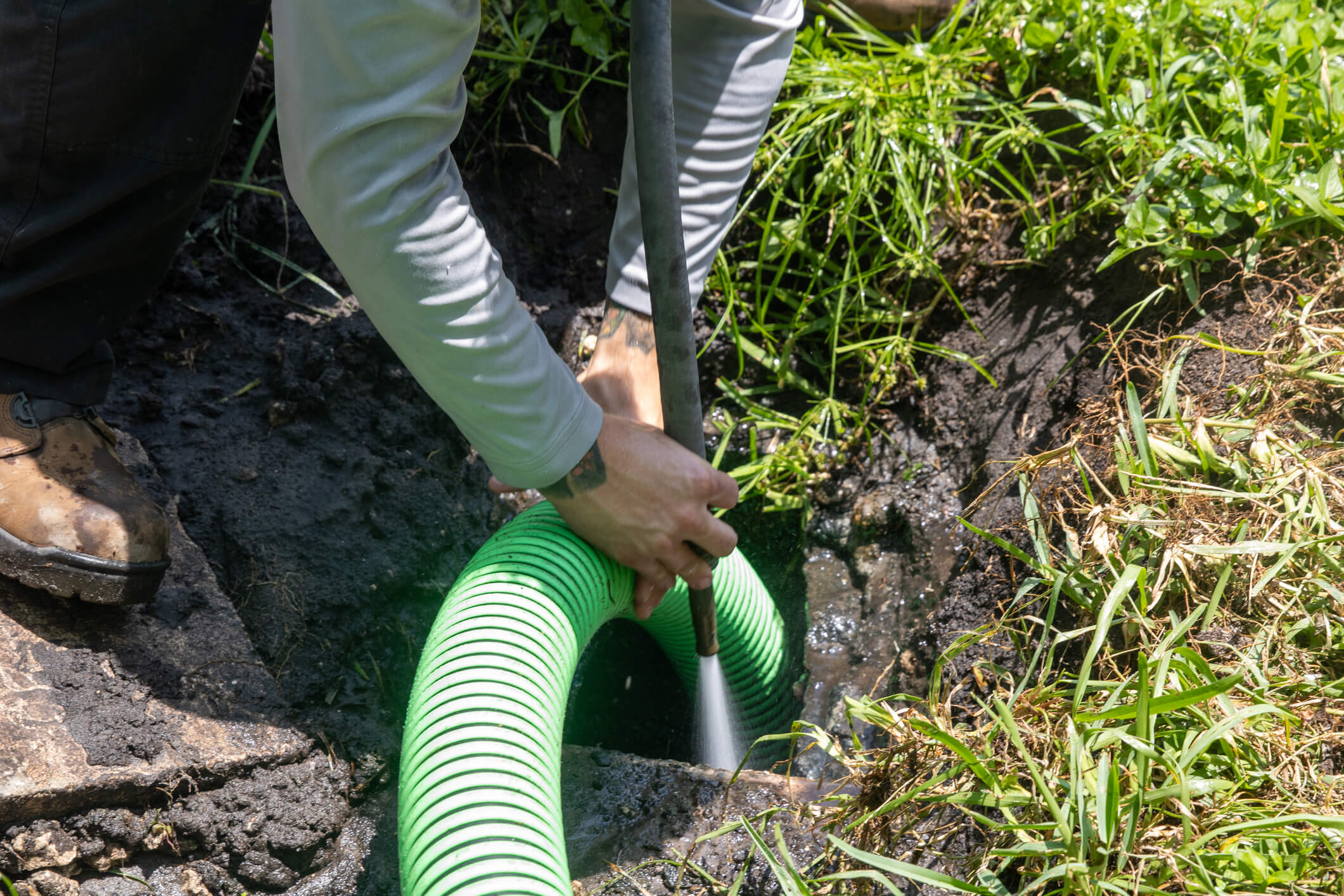When it comes to ensuring comfort in our homes, one of the unsung heroes is the water heater. This vital appliance plays a crucial role in our daily lives, providing the hot water needed for showers, washing dishes, laundry, and more. In this overview, we’ll dive into the world of water heaters, exploring the different types, how they operate, and what factors to consider when choosing the right one for your home. Whether you’re installing a new system or replacing an old one, understanding the nuances of water heaters can help you make an informed decision, balancing efficiency, cost, and your household’s needs.
What Is a Water Heater?
A water heater is an essential home appliance designed to consistently provide hot water for various domestic activities such as bathing, cooking, cleaning, and space heating. It operates by heating water to a preset temperature and storing it until needed, ensuring that hot water is available on demand. Traditional water heaters typically consist of a tank that stores and heats the water, whereas tankless models heat water directly as it flows through the device, offering a continuous supply. Water heaters can be powered by various energy sources including electricity, natural gas, propane, and solar power. The choice of a water heater depends on factors like household size, water usage habits, and energy efficiency preferences.
Modernize created this guide to provide homeowners with an in-depth look at hot water heaters from top to bottom. We’ve covered how hot water heaters work, the main types of hot water heaters, baseline costs for new systems, and we can even help you get connected with a certified plumbing service contractor in your area if you think your unit needs maintenance, repairs, or replacing.
How Do Water Heaters Work?
In this section we’ll look at the two main types of hot water heaters: Gas and electric. We’ll cover tankless, solar, and other styles of hot water heaters in greater detail a bit later.
Gas and electric hot water heaters function basically the same. Cold water enters the top of the unit through a dip tube (a fancy way of saying plastic pipe) that ends about eight inches from the bottom of the tank. Here’s where the two types of systems differ, though. Gas systems use a burner fired by natural gas or liquid propane to heat the bottom of the tank. Electric systems, meanwhile, heat water using an element inside the tank. Gas systems also have a chimney to remove exhaust gasses that also heats water from within the tank.
Hot water is pumped throughout your home via the heat-out pipe, also located atop your unit. Both systems have thermostats to control the overall water temperature, a pressure-relief valve, drain valve and anode rod that helps prevent corrosion. The tank itself is often wrapped in insulation.
Types of Water Heaters
Most homes have gas or electric hot water heaters. But there are many styles from which to choose if you are shopping for a replacement hot water heater. Here’s a rundown of seven different types of hot water heaters.
Standard Storage Tank Water Heaters
Traditional water heaters use a large storage tank to hold hot water until it’s needed. Standard storage tank water heaters range in size from 40 to 120 gallons — we’ll cover which size works best for your home a bit further down.
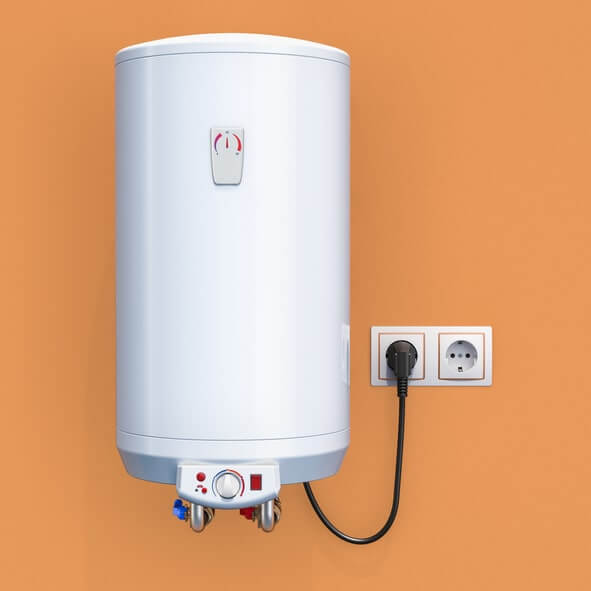
Electric Water Heaters
Electric hot water heaters use one or two elements to heat water brought into the tank from the dip tube. Sensors in the tank trigger the thermostat to kick on and heat additional water or maintain a pre-set water temperature.
Benefits: Electric hot water heaters are usually easy to install. They often are less expensive to purchase and install as well.
Drawbacks: Although they are energy efficient, electric water heaters can cost more than gas to operate.
Expect to pay around $1,500 for a replacement electric water heater. Cost will vary depending on size, difficulty of installation, and contractor costs.
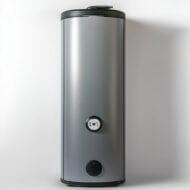
Gas Water Heaters
Gas water heaters use a variety of fuels, including natural gas, propane, or fuel oil to fire a burner at the base of the tank to heat the water.
Benefits: Gas water heaters are typically less expensive to operate than other systems. Your hot water supply also is never affected if the power goes out. Lastly, gas tends to heat faster than electric.
Drawbacks: Gas-fired hot water heaters are generally more expensive than electric models. They also can be more expensive to install and maintain.
Expect to pay around $800 to $1600 for just a replacement tank unit.
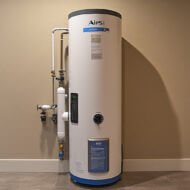
Tankless Water Heaters
This type of hot water heater is also known as an on-demand water heater since it only produces hot water when it’s needed. Tankless hot water heaters instantly heat water when the hot faucet is turned on with a gas or electric heat exchanger inside the unit.
Benefits: You’ll never run out of hot water. They also are more efficient than other types of hot water heaters in homes that don’t require much hot water on a daily basis. Life expectancy also can reach 20 years or more.
Drawbacks: Output of hot water can be limited.
Tankless hot water heaters cost around $1,000 on average, but smaller units can be cheaper. Larger, high-output tankless water heaters, meanwhile, can cost upwards of $2,000.
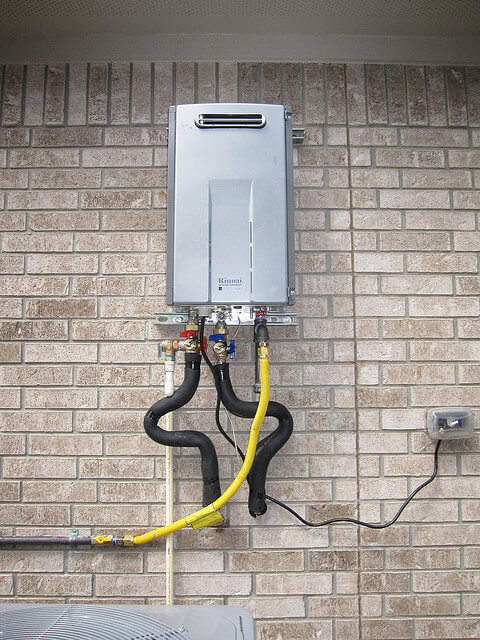
Heat Pump Water Heaters
These systems are also called hybrid water heaters because they gather heat from surrounding air and force this high-temperature air into a tank to heat water.
Benefits: This is an extremely energy-efficient method of heating water. There also are federal rebates for purchasing this type of hot water heater.
Drawbacks: This system is usually more expensive than standard electric or gas systems. This system also won’t operate effectively in cold environments.
Expect to pay around $1,200 to $2,500 just for the heat pump unit depending on tank size.
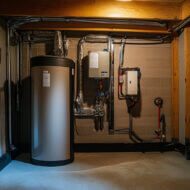
Solar Water Heater
There are two main types of solar water heaters. Active systems include circulating pumps and controls, while passive systems do not. Active systems are more expensive because they have more components. Passive systems are generally not as efficient. Each system, though, uses solar energy and rooftop collectors to heat water.
Benefits: Federal tax credits can reduce investment costs by 26% of installation costs. Solar water heaters can reduce hot water heating costs by as much as 80%.
Drawbacks: With the drop in solar panel costs, it can be easier and more cost-effective to install rooftop panels to heat a standard electric water heater.
Solar water heaters can be expensive, oftentimes approaching $5,000 for active systems. Tax credits can offset this cost, though.
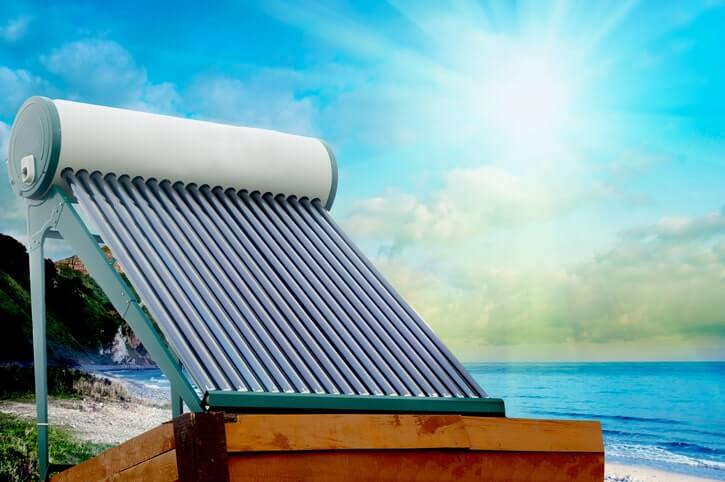
Condensing Water Heaters
High-efficiency condensing water heaters work much like standard gas models, but they transfer and retain a greater amount of heat, which reduces energy use and saves money. They are often a great choice for homes that use natural gas or liquid propane stored in tanks for the home’s primary energy source. Condensing water heaters use heat exchangers submerged inside the tank to retain heat from combustion, which greatly increases the heater’s efficiency.
Benefits: The higher output of these water heaters provides more hot water, and the increased efficiency will lower energy costs.
Drawbacks: Costs are far higher than standard systems, and these units also require gas lines and exhaust venting.
A condensing water heater can cost more than $2,000 just for the unit.
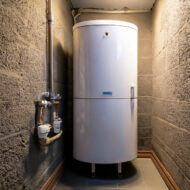
Water Heater Standard Sizes
Running out of hot water during your morning shower isn’t a great way to start the day. Thankfully, hot water heaters come in a wide range of sizes to provide increased water storage for larger families and heavier users of hot water.
Hot water heaters are rated by their storage capacity and come in standard sizes ranging from 40 to 120 gallons. Most homes come with 40- or 50-gallon standard storage water heaters. If you consistently run out of hot water, it’s a sure sign your home needs a larger tank. Tankless water heaters, of course, don’t have any capacity limits and can supply endless hot water.
Use the chart below to get a baseline idea of the size of water heater that should work best for you and your family’s needs based on normal demand. Heavy hot water users should add at least 10 gallons to each capacity listed. Also, electric water heaters don’t refill the tank as fast as gas water heaters, so take that into account as well.
| Family Size | Electric Gallon Capacity Required | Gas Gallon Capacity Required |
|---|---|---|
| 1–2 | 40 | 40 |
| 2–3 | 40–50 | 40–50 |
| 3–4 | 50–75 | 50–75 |
| More Than 5 | 80–120 | 80–120 |
Heat pump water heaters typically have a capacity between 40 and 80 gallons. They also are slower to heat water than comparable systems, so look for larger sizes if you expect heavy hot water demand at certain times of the day.
How Much Does a Water Heater Cost?
When considering a new water heater, understanding the various costs involved is key to making an informed decision that suits your budget and needs. No matter which system you choose, installing a new hot water heater is expensive. Expect costs to run from $1,200 to several thousand depending on the complexity of the installation, which can include venting, gas line installation, and your plumbing contractor’s labor costs. Labor can range from $80 to $140 an hour or more depending on where you live and current consumer demand for services.
If your unit is only a few years old, it may be more cost-effective to repair it rather than replace it. Repair costs will vary depending on what’s wrong with your unit. Expect an average of around $600. However, replacing certain integral parts might prove less expensive. A new thermostat should run around $150, while a heating element for an electric unit could cost between $200 and $300. Installing a new anode rod, meanwhile, could cost less than $100. Your plumbing contractor can determine what’s wrong and should provide an estimate of what to expect when the final bill comes due.
If your unit is nearing the end of its expected life span — around 10 years or more for standard storage systems — you might want to consult with a licensed plumbing or HVAC contractor to determine if it’s a better investment to replace the system rather than repair it. The money you spend on repairs might be better spent on a new system.
How Long Does a Water Heater Last?
On average, standard system hot water heaters should last between eight and 12 years. Tankless water heaters have a life expectancy between 18 and 20 years. You can use the chart below to help determine when to inspect and possibly replace your system.
| Water Heater Type | Inspect After: (number of years) | Replace After: (number of years) |
|---|---|---|
| Electric Water Heater | 1 year, and each year after | 8–12 years |
| Gas Water Heater | 1 year, annually thereafter | 8–12 years |
| Tankless Water Heater | 1 year, and each year after | 18–20 years |
| Solar Water Heater | 1 year, annually thereafter | 18–20 years |
| Condensing Water Heater | 1 year, and each year after | 8–12 years |
Annual inspections can help avoid significant maintenance issues and extend the life of your water heater. You may elect to keep an older water heater in service, and it may work well for many years after its suggested lifespan, but eventually key components of the system will fail and you’ll need to have a service technician out to fix or upgrade your system.
How to Find Water Heater Installers
Installing a new water heater is a job best left for licensed professionals — there are just too many critical components involved for DIY-minded homeowners to try winging it.
Modernize can help homeowners find licensed and reliable water heater installers in their area. These professionals can help you determine what type of hot water system best meets your needs and fits within your budget. They also can let you know about payment and financing options so you can get the project started as soon as possible and get that hot water flowing again.
Compare top-rated plumbing pros in your area.
Read real homeowner reviews, explore qualifications, and view promotions. Modernize makes it easy to browse professionals and find one that will be perfect for your project.
